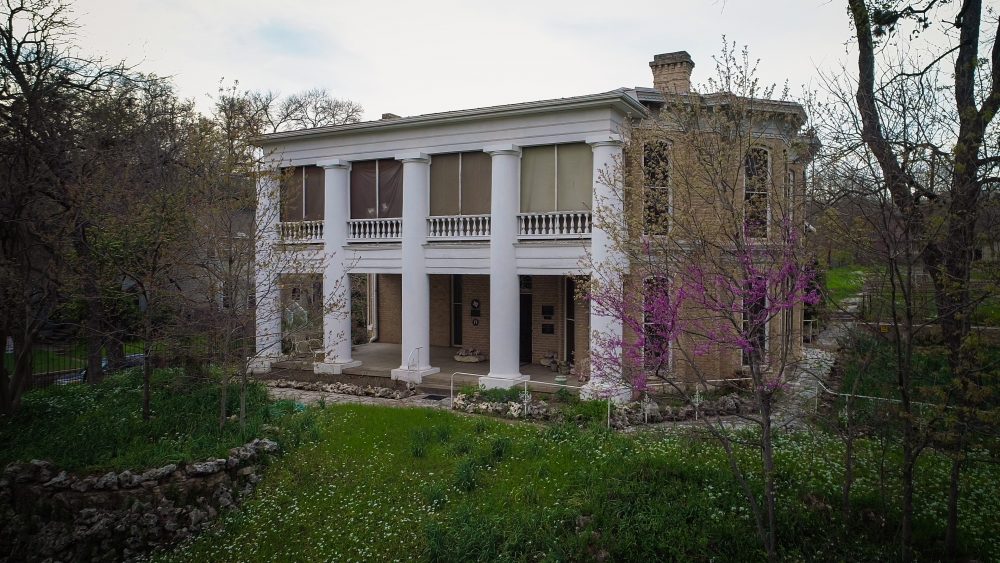 Texas has lots of museums—more than 600—ranging in focus from art to history, science, education, railroads, geology, fossils, and even quarter horses. It would seem improbable that anyone could think up a whole new category, a new concept of what a museum can be. But that’s what is happening at Austin’s Flower Hill Urban Homestead, which will hold a grand opening party this weekend and open to the public in January.
Texas has lots of museums—more than 600—ranging in focus from art to history, science, education, railroads, geology, fossils, and even quarter horses. It would seem improbable that anyone could think up a whole new category, a new concept of what a museum can be. But that’s what is happening at Austin’s Flower Hill Urban Homestead, which will hold a grand opening party this weekend and open to the public in January.
In 1874, Presbyterian minister R.K. Smoot of Bowling Green, Kentucky, moved to Austin to serve the congregation that later became Central Presbyterian Church. Horrified that the church was selling space in its pews—the more you gave, the closer to the front you got to sit—Smoot returned as pastor in 1876, along with his reluctant wife, Sally, and sons Asher and Lawrence, ages 7 and 1. Over time, the Smoots became one of Austin’s most civically-engaged families. Flower Hill aims to preserve and project the Smoot family’s ethic of civic enrichment, of being useful—a museum really of how to be—how to live, engage, and serve one’s neighbors.
Rev. Smoot adored Austin’s natural surroundings and purchased a small farm a mile and a half west of the city. There, on a hillside next to a small spring-fed lake, he built a solid four-room house in the high Victorian “Italianate” style. Relatives soon came to join them, sending money ahead to add onto the house so they could move in, until the extended clan lived in the ponderous 14-room mansion that now faces West Sixth Street.
So many bonds tie the grand house to Austin’s past. The ancient live oak in the back yard has a radically twisted limb pointing east—thought to be a rare surviving Native American signal tree. Beneath this mighty oak, the repurposed limestone slabs of the rear walk once paved Congress Avenue. The house is built of bricks made at Barton Springs; many were laid before they were completely dry and still bear the masons’ fingerprints. Many more bear the graffiti of generations of Smoot children.
William Sydney Porter, better known as short-story master O. Henry, was one of many Smoot parishioners who married in the parlor. Fortunat Weigl, a prominent local iron worker, crafted the wrought-iron gate and rose arbor in a foundry that now houses Iron Works BBQ. The free-standing lumber room, built as a temporary shop by the building contractors but never torn down, housed the Smoot’s long-time cook, Willis Maxwell, and is one of the very few remaining connections to the African-American “Freedmen’s Town” that became the Clarksville neighborhood. At the rear of the 1.38-acre lot, the original barn and chicken coop recall Smoot family members pedaling bicycles up and down Pecan Street (now Sixth Street) selling eggs. They also ran a mail order business in Fancy Indian Game Hens, and cows grazed on the property until the 1950s.
Why would the family who lived in a mansion like this need butter-and-egg money? Because they were not wealthy. They were too busy trying to do good. At one time as many as a dozen Smoots lived here and contributed to the household. Rev. Smoot helped found the institution that became Austin Presbyterian Theological Seminary, whose library today is named for him. Asher Smoot was a founder of the Austin American newspaper. Lawrence Smoot was the reporter for the Texas Supreme Court for 66 years, making him the longest-serving civil servant in Texas history. Lawrence’s wife, Julia, taught history; her sister from Milam County, Amelia Williams, lived for many years with the family while studying to become one of the leading Texas historians of her generation and editor of Sam Houston’s papers. During the Great Depression, the Smoots helped needy artists, taking in houseguests in exchange for leaving a painting behind—art that still hangs on the walls.
In 2013, Julia’s daughter, Jane Smoot, the last of the line, died at age 93 on the upstairs sleeping porch, an event that caused the EMTs to remark on the handy “coffin turn” staircase, a 19th-century feature from a time when home funerals were common. Jane Smoot taught English at Austin and Travis high schools for over 40 years (many museum visitors remember her vividly) before retiring and preparing to give the family home to her beloved city. She formed a tax-exempt foundation to own the property, folded her small teacher’s pension into a trust, and devoted her time to tagging, with hand-written labels, more than 4,000 family artifacts. After Jane Smoot’s death, the house was virtually sealed for five years, its trove of artifacts as intact as King Tut’s tomb, as forces were marshaled, funds raised, and permits finally granted to open the museum.
Yet, with all the tonnage of antique furniture and folk art and family memorabilia, Flower Hill is not a museum of things. It displays wonderful things, but the museum’s board and director together have crafted a new vision of a museum’s relevance to the modern community as a tribute and model of civic engagement. The property’s resurrected gardens, 19th-century cistern, and chicken coop will enable docents to teach classes in sustainable gardening and urban husbandry, with its produce donated to food pantries for the needy. Honoring the family’s dedication to scholarship and the arts, Flower Hill plans to include continue its sponsorship of artists in residence, to host literary events, a book club, and even an annual “boot camp” for aspiring young writers.
Along with this weekend’s grand opening party, upcoming Flower Hill events include an annual fundraiser on Dec. 13, which is also Jane Smoot’s 100thbirthday, and starting in January, public tours by appointment.








